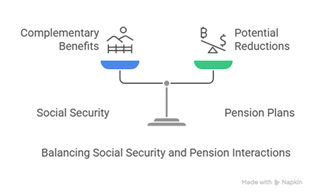Posted On: 04-04-2025
How Social Security Affects Your Pension
If you're planning for retirement, understanding how Social Security interacts with your pension is crucial. The impact largely depends on whether your pension comes from a job that contributed to Social Security or one that did not.

Pensions from Jobs That Paid Into Social Security
If your pension comes from a private-sector job or a government position that required Social Security tax contributions, your benefits won’t be affected. You can receive both Social Security and your pension without any reductions. Your Social Security benefits will be calculated based on your lifetime earnings.
Pensions from Jobs That Did Not Pay Into Social Security
For individuals receiving a pension from an employer that did not withhold Social Security taxes, such as some state or federal government jobs, two key provisions may reduce their benefits:
Windfall Elimination Provision (WEP) – This applies if you worked in a job that didn’t pay into Social Security but still qualify for benefits from other employment. WEP can reduce—but not eliminate—your Social Security benefits, depending on the number of years you contributed to Social Security.
Government Pension Offset (GPO) – If you’re eligible for Social Security spousal or survivor benefits, the GPO may reduce or completely eliminate these payments based on your pension amount.
Tax Considerations
Your Social Security benefits and pension income may be subject to taxation. If your total income—including pensions and other earnings—exceeds certain thresholds, up to 85% of your Social Security benefits may be taxable.
Conclusion
Understanding how your pension affects Social Security benefits can help you plan for retirement wisely. Consulting a financial advisor or using the Social Security Administration’s online tools can provide a clearer picture of your future benefits.